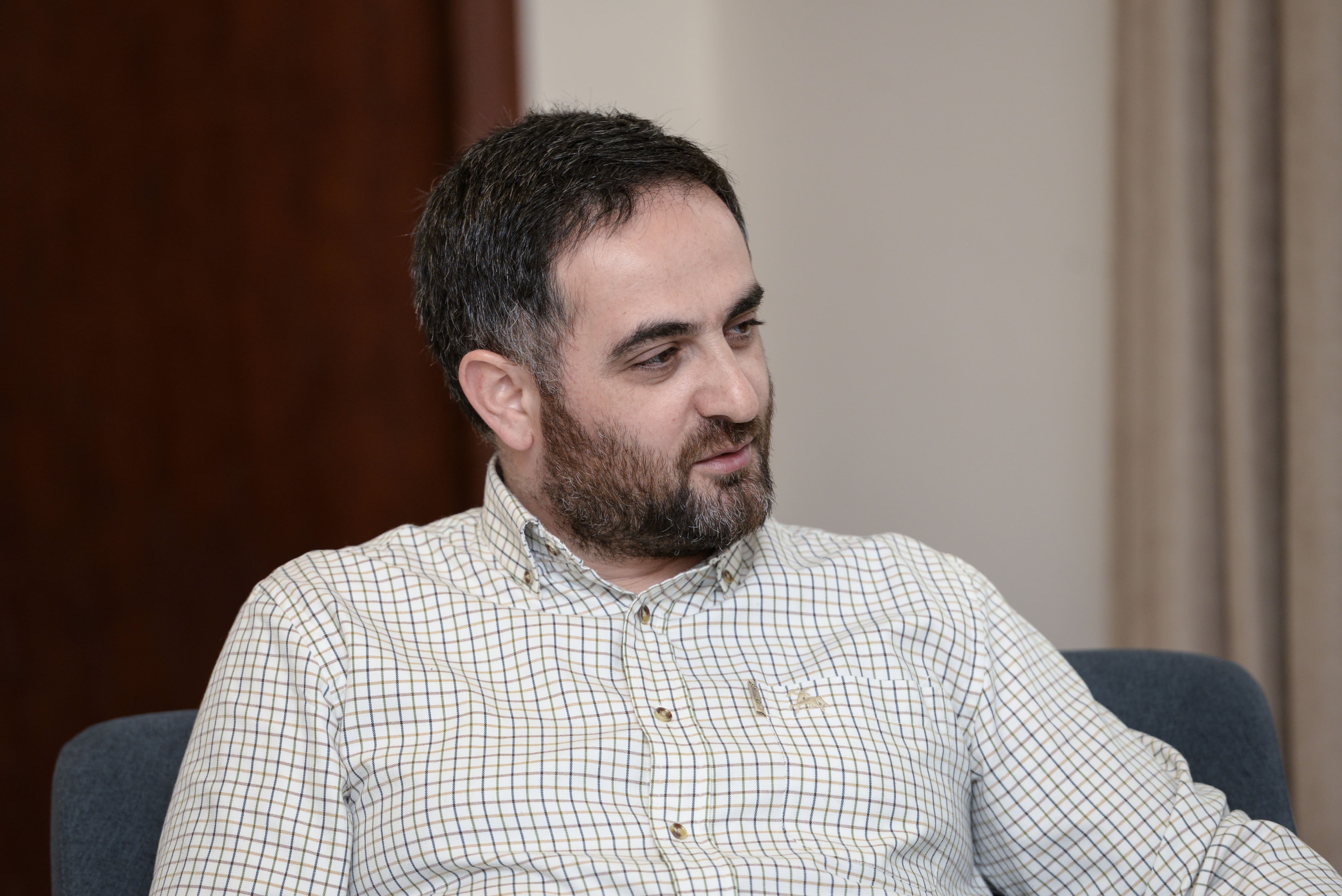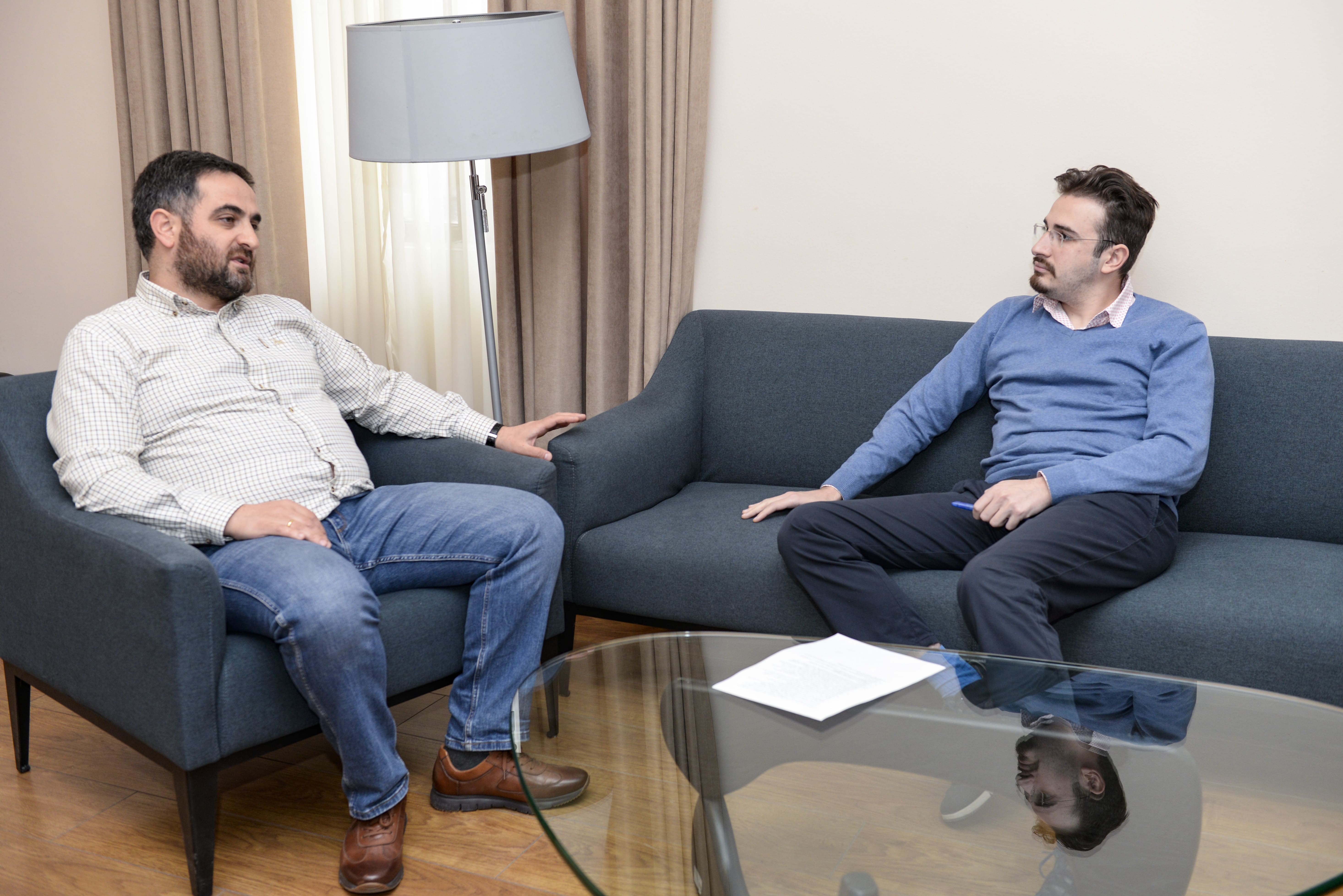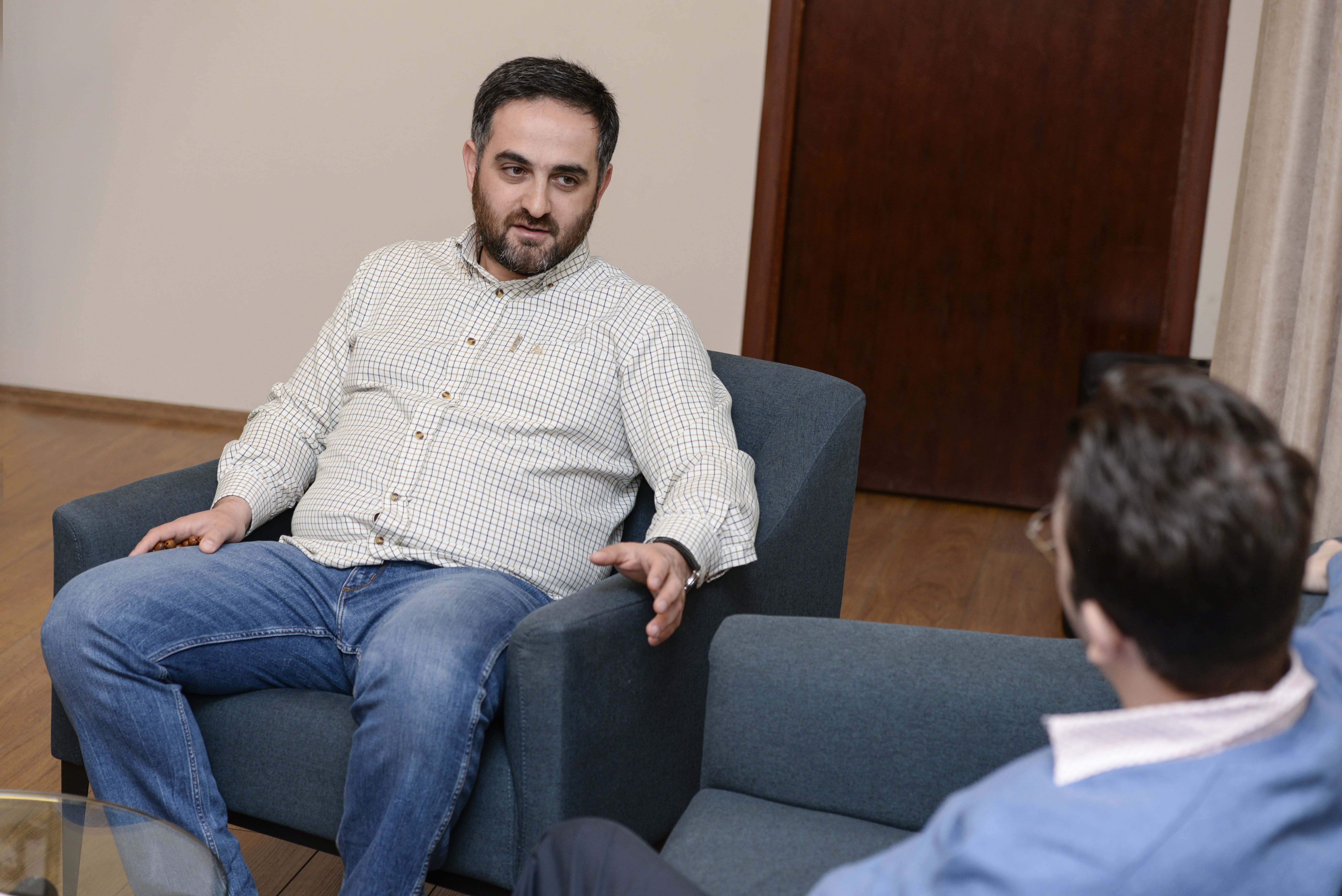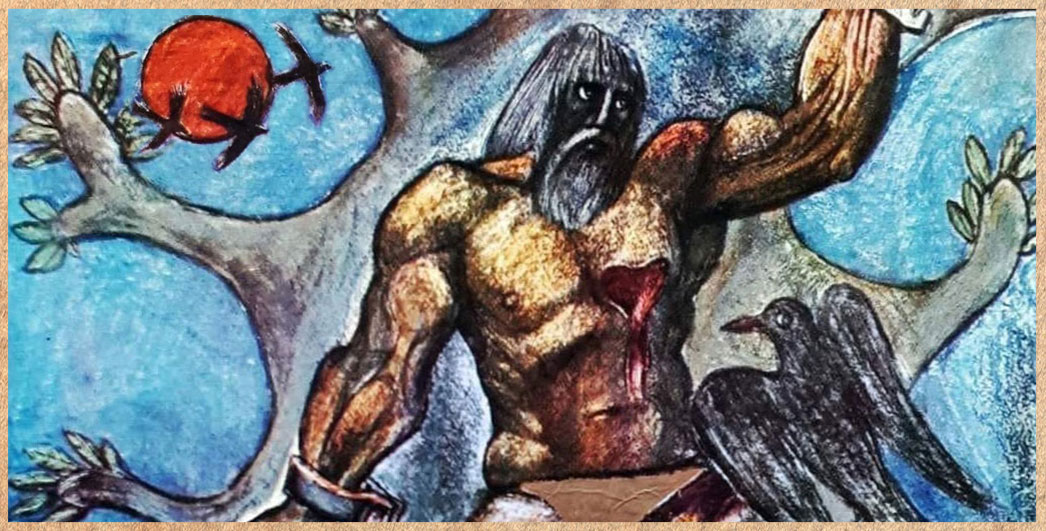Interview with Giorgi Donadze
Given the importance of the first issue of this magazine, the editorial board considered it fitting to discuss Georgian folklore and the challenges it faces, in all three dimensions of time, with a professional whose work has been connected to this field for years, and whose opinion is valuable within the discourse of the current processes within it. We truly could not have chosen a better interlocutor than Giorgi Donadze, an experienced singer and choir leader who is currently in charge of projects related to the preservation and promotion of Georgian traditional art as director of the Folklore State Center. A rather lively and healthy conversation took place between us. We tried to fairly cover all aspects of folklore, not just music, but since both of us come from the branch of musical folklore, we must admit to our subjective biases.
We present to you an interview with Giorgi Donadze.
Giorgi, tell us about yourself. How did folklore become the main calling of your life? What put you on the path to the directorship of the Folklore Center?
This is an interesting story. Everything started from the family: my grandparents sang well. My grandmother was Ts’eseli Kereselidze, a very active woman, who performed on stage in Rach’a and played the daira (a kind of drum). I would always hear songs from Lower Rach’a from my grandmother. My mother used to sing very well, but she has not been doing much of it in recent years. In short, the family was blessed with song. Anzor Erkomaishvili and Temur Kevkhishvili’s program on Channel One awakened my interest in Georgian folk songs. In 1989, at the request of my mother, my father and I brought my brother Gela to Jumber Kolbaya’s Ensemble Fazisi. Gela had a good voice, and was a natural performer, and Jumber liked him very much. As for me, he said to my father: “let's try this one too, and the brothers will sing together.” But I was shy, and my voice did not stand out—children were selected by their voices back then.
Do you think this approach was correct?
No, of course not! If I had gone to another ensemble, they most likely wouldn't have accepted me. Jumber tested my ear and accepted me. Fazisi wasn't a big choir back then, but the most important thing was that we fell in love with singing. Time passed, and I became more and more interested in folk songs. I listened to everything. I started with Ensemble Rustavi's records. This was followed by the audio recordings from 1901–14 published by Anzor Erkomaishvili. I was forever connected to folk singing. My brother and I moved from Fazisi to Mdzlevari when I was fifteen or sixteen years old. While I was in Mdzlevari, Kakha Onashvili persuaded me to enter the vocational music school, where I was taught by outstanding teachers. I learned to conduct. I would often walk from Sanzoni to Dolidze—from the music school back home—humming and conducting all the way. By the way, this habit has followed me to this day: when I put my children to sleep or caress them, I always “play” Gurian bani (bass) lines with my fingers. In 1995, together with our friends, we moved from Mdzlevari to Ensemble Bich’ebi, and at the same time formed the ensemble Berika. I gathered good soloists, and it was on the foundation this group that Basiani would later come to be. While working in Ensemble Berika, I remember well one significant episode, which, one might say, had a great impact on the later stages of my creative life. It was meeting Anzor Erkomaishvili. When Anzor heard us for the first time, we sang “Chela,” which we performed together with Eka Jojua. I remember that Anzor could not hide his admiration, and after that he went to my father and said, “This boy must continue on this path.” This is where the cooperation and friendship between me and Anzor began! It was a very interesting period in terms of creative development. The prominent ensembles at that time were Rustavi, Anchiskhati, Old Mtiebi, Georgian Voices, Erisioni. It was in this environment that my taste was formed. At the same time, I also worked with Giorgi Ushikishvili in Lashari, and we held many interesting concerts together.

Once, I was standing with my friends near the N28 music school, where the Bich’ebi ensemble was rehearsing. It was at this time that I met Malkhaz Erkvanidze, who taught chanting at the same school. He suggested that I join the newly created choir of the Sameba (Trinity) Cathedral. Later I met the founder of the choir, Svimon Jangulashvili, and we became friends.
After some time, together with my friends, we started singing in the Patriarchate choir of the Trinity Cathedral. At the end of 2000, this group formed Ensemble Basiani, and Svimon was the ensemble’s godfather. In 2001, we held a joint concert at the Jansug Kakhidze Music Center, which received a great response. From this point started Basiani’s dedicated work.
Zura Tskrialashvili, Paata Tsetskhladze, and I enrolled in the conservatory together and received professional education. I remember the support of the conservatory with real gratitude. With consistent practice, Basiani also progressed. There were many obstacles, but we did not lack the moral or financial support of listeners, friends, and patrons. In November 2013, by the order of Bidzina Ivanishvili, we were granted the status of a state ensemble. In December, I was appointed the director of the Folklore Center, so I got to be the director of Basiani for just one month.
In social and professional circles, it is often noted that folk songs receive more attention and are given more priority than other branches of folklore. And the facts are stubborn: almost all the directors of the Folklore center have so far been musicians. Is this a coincidence or an intentional attitude?
Today, there are five directions in the folklore center: oral performance, folk music, choreography, fine and applied arts, and Georgian traditional chanting. As the director of the center, I am obliged and try to support all fields equally. As for the preferential attention to musical folklore, it is true, and no one takes offense: Georgian folk songs are admired in the world, as are Georgian chants. If we look at the history, Ilia Chavchavadze and his comrades paid a lot of attention to this subject—it was at that time that the chant transcription committee was created. Everything adds to the immeasurable effort that goes into promoting Georgian songs in Georgia and abroad. We should not fight against this fact, but we should strengthen other fields as well. For example, I will single out fine and applied art, which is not a strong direction at the center at the moment, although this field, in general, is not neglected: it has a lot of support from Georgian non-governmental organizations, as well as from foreign international funds. They invest a lot of financial resources to develop this industry. As the leader, I am ready to support and implement all good ideas. However, it is also necessary for specialists in different areas of folklore to be actively involved; otherwise, we will not achieve the desired goals.
You have been leading the State Folklore Center for nine years. For me personally, one of the most successful projects in this period is the choirmaster (lot’bari) school program. Could you tell us about this? And to continue with the previous question: apart from singing, are the other branches of folklore represented?
One of the main and most important ways to increase the popularity and love of Georgian folklore goes through teenagers and young people. I will testify to the immortal phrase of Anzor Erkomaishvili: if you want to save a song, you have to teach it to children. Our goal is for teenagers to get a taste of Georgian singing and then to decide for themselves whether or not to follow the footsteps of their ancestors.
Opening schools is not easy. It is a difficult process and there is a problem of infrastructure and qualified personnel. Choir masters have to travel from Tbilisi to teach in some of the cities. We pay great attention to the selection of teachers because everything in the teaching process depends on them. As for the presence of other fields of folklore in these schools, despite the fact that developing the curriculum of each direction is a rather difficult process, we have crossed the Rubicon in some places: Georgian (Svan) folk dance is now taught in the school in Lentekhi. In the near future, young people will learn how to play gudastviri (bagpipes) in Rach’a. We also think about student activities at these schools, which is why we founded the annual festival “Voices of the Future.” The festival remains an unforgettable memory for each participant. The goal of the festival is for children from different regions to get to know each other, get closer, make friends and, most importantly, come together through the love of Georgian folklore! We are planning many interesting activities in the future. At present, thirty schools are open in Georgia, and this number will surely increase with time.
Could we say, then, that the problem of modernity—the disappearance of interest in folklore—is not so acute? Do you think tradition and progress (modernity) have clashed? If so, what can be done to make the new generation more interested in folklore?
I repeat: a big challenge for us is the relationship with the new generation. The issue of folklore and modernity has become a dilemma. We should not be associated with backwardness and stagnation: we should try to keep up with the present as much as possible. Folklore is a living organism, and we cannot not allow ourselves to be idle: we must pay attention, use the latest theoretical, practical, and technological methods, but in no case should we cut off the roots, cut off the connection with our past. As for attracting young people and their active involvement, sociological research is necessary. We must understand what they want, what they demand from us, and adapt to their wishes. Folklore should be made easily accessible to everyone.
This issue to a certain extent echoes the controversy that exists in modern Georgian ethnomusicological circles regarding performance aesthetics. What do you think: to what extent is it correct to approach performance practice with set stereotypes of “right” and wrong” and conduct inspections on the ground, in the regions? Moreover, we often hear a sad reproach—“they come from Tbilisi and teach us how to sing.”
In general, my attitude towards regional ensembles is as follows: they must know what their ancestors left them! As for the repertoire, they have complete freedom there. It is not my business how and what songs they might perform in the choir—it is their personal choice. Ultimately, the community will still have a preference regarding performance style or repertoire. We also gave freedom of repertoire to the choir masters at our schools. Obviously, first of all, the repertoire should be expanded with local songs. We should not establish creative regulations—this is possible, and this is not—we should break stereotypes. Unfortunately, because of such regulations, we are looking at thirty years of tension in Georgia, which must be relieved. Before my directorship, there was a commission that issued licenses, taught accomplished singers in the regions how to sing. This is wrong! This was a big mistake on the part of the folklore center. In fact, the center set these boundaries for those from whom they should have been learning to sing. This is an anomaly that must not be repeated. I believe that creative freedom is necessary and vitally important.

Where is the golden middle, how to determine what can be interfered with, so as to leave creative freedom to the performers?
This is a dangerous topic. I think that in such a case, a commission with the participation of foreign experts should be created, which will issue recommendations and leave creative freedom.
Let's summarize the nine years of your directorship: tell us about the challenges, problems, and successes you faced.
The folklore center will always have challenges, but we do not have the luxury of being satisfied with what we have achieved. Complacency equals degradation, a step backward. Once again, I repeat: our main challenge is to communicate with young people, educate them correctly, and transfer knowledge. Unfortunately, we often fail to support the next generation properly. It is our duty to pass on knowledge, to pave the way for them to properly follow the path of our ancestors. Our main desire and goal is to involve more young people in the activities of the center, and we will definitely do this in the near future.
As for the successes: the choir master school project was looked upon with skepticism at the beginning, yet from today’s point of view it is one of the most successful projects we have undertaken. Digitization of chant sheet music, the publication of an anthology, and, in general, the development of the direction of chanting has also been successful. We founded an international festival, created a unique sound recording studio, and opened a new concert hall, as well as completely renewed the sound recording equipment of the studio. It is also worth mentioning the opening of the State Folklore Center in Ozurgeti—Guria really deserved it. There is a lot to talk about, but I’ll stop here. Implementation of these projects was not easy; it required a lot of moral and financial support. I must note, with gratitude, that there has never before been such substantial support from the state towards our field.
As you know, this interview is for the first issue of our new magazine. What can you tell us about the significance of this publication?
This is an unprecedented initiative: the great Georgian folklore will have its own magazine! And the most important thing: the magazine covers every direction of folklore. The authors of the articles will be qualified specialists. Nothing is perfect, but despite the obstacles and difficulties, I am sure that our magazine will be one of the best among popular research publications. The team that heads the magazine gives me the right to say this. We will move forward step by step, we will become stronger, and it will become a magazine that local and foreign audiences will look forward to with great interest.
To finish up, are there any topics we did not touch on in the conversation, but that you wanted to discuss?
The topic of youth. I think about them a lot. I want to somehow transfer all my experience to them, but, unfortunately, I don’t have the necessary time. I want them to know the art of singing, how to sing properly, how to prepare for a concert, how to choose a repertoire, in short, everything that I spent years on and learned by interacting with the legends in this field. Wanting to do something is one thing, doing it is another. Constantly postponing something is wrong, because we are all equally responsible for the future.
And finally, I want to impart to all representatives of folklore that learning never ends. We should not stop and be satisfied with what we have achieved, we should constantly strive for development and innovation. Work, work, and more work. If we don't pour our blood into our work, we will not reach the desired result.
I wish everyone success!
Good luck to our magazine!

%20%E1%83%A1%E1%83%90%E1%83%9C%E1%83%93%E1%83%A0%E1%83%9D%20%E1%83%9C%E1%83%90%E1%83%97%E1%83%90%E1%83%AB%E1%83%94%20-%20%E1%83%9E%E1%83%A0%E1%83%9D%E1%83%94%E1%83%A5%E1%83%A2%E1%83%98%E1%83%A1%20%E1%83%AE%E1%83%94%E1%83%9A%E1%83%9B%E1%83%AB%E1%83%A6%E1%83%95%E1%83%90%E1%83%9C%E1%83%94%E1%83%9A%E1%83%98%2C%20%E1%83%A1%E1%83%90%E1%83%A0%E1%83%94%E1%83%93%E1%83%90%E1%83%A5%E1%83%AA%E1%83%98%E1%83%9D%20%E1%83%A1%E1%83%90%E1%83%91%E1%83%AD%E1%83%9D%E1%83%A1%20%E1%83%AC%E1%83%94%E1%83%95%E1%83%A0%E1%83%98-min.jpg)


